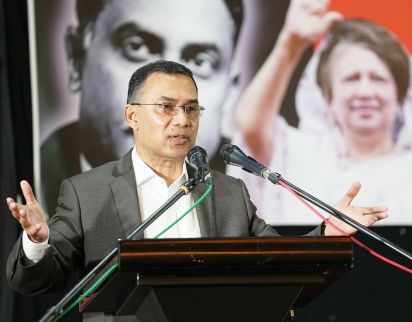With the resignation and cowardly escape of then-Prime Minister Sheikh Hasina on August 5, 2024, the Bangladesh Nationalist Party (BNP), under its imprisoned Chairperson Khaleda Zia and Acting Chairman Tarique Rahman, has fulfilled its historic duty toward the people of Bangladesh. Braving 17 years of struggle, torture, murder, extra-judicial killing, extraordinary rendition, repression by law enforcement, paramilitary, and military forces, a hostile judiciary, and a sizable press contingent that saw more profit in flattering a dictator than fighting for democracy, BNP remained steadfast in its mission to bring back democracy to Bangladesh. With a caretaker government headed by Dr. Muhammad Yunus now in place, which will oversee the crucial transition to the next elected government, the democratic prospects of Bangladesh now look assured for the foreseeable future.
To understand the enormity of what BNP has achieved, it is incumbent to reflect on the vast forces that were arrayed in support of Hasina. The 1/11 coup of 2007 was predicated on a belief in much of the world that the democratic aspirations of Bangladeshis were subordinate to the perceived security interests of Bangladesh’s neighbors and other interested powers. To uphold this arrangement, in the guise of Hasina, a modern-day Mir Jafar was installed as a prime minister in name but dictator in effect. She ruled through twin pillars of coercive state repression and a loan-fuelled construction binge that successfully channeled billions of dollars to the ruling Hasina family and their oligarchs and cronies, but did little to raise the standard of living of the average Bangladesh. Compared to 2009, the first year of Hasina’s tenure, Bangladeshi today is more unequal, has much higher inflation, and an explosive increase in foreign debt.
Through the three failed and illegal elections of 2014, 2018, and 2024, BNP has absorbed its defeats, the hundreds of thousands of court cases filed against it, the systemic efforts to dismantle its leadership, and the incessant violence aimed at the party from all levels. Indeed, to be affiliated with BNP since 2007 was to have an open license of violence against your person, your home, your property, and your family. BNP individuals were treated not as citizens, even second-class, not as subjects, not as slaves, but some spoils of war in the colony of a foreign empire, to be brutalized and exploited at the whim of the Awami League ruling class.
The abiding image remains of BNP Secretary General Mirza Fakhrul Islam Alamgir sitting outside the BNP office on October 28, as the police and Hasina’s party muscle launched a crackdown on BNP’s wholly peaceful rally in Dhaka. He sat in a small circle of light, as the darkness seemed to close in around him from every direction. Yet, we should have remembered our history, and its lessons. Just like it took 266 days to go from the despair of Match 25 to the victory of December 16, it took us just a little longer of 282 days to go from the seeming defeat of October 28 to the joy of freedom on August 5.
While a full appreciation of the scope of BNP’s political strategy and various approaches is beyond the scope of this article, it is worth taking a moment to appreciate the last major decision taken in the fight against Hasina’s fascism that directly shaped the moment we are in now. The seeds of this current victory were planted in BNP’s decision to boycott the dummy election of 2024, completing Hasina’s complete isolation from Bangladesh’s political system and its civil and intellectual establishments. BNP waged a completely non-violent movement against repeated crackdowns and brutalities on part of the Hasina government. The city-wide attack on BNP’s activists on October 28 last year, and the three-month repression that followed until the election was over, forced the world to sit up and notice Hasina’s predation. The mask had slipped, and the ugliness underneath could no longer be denied.
With Hasina completely void of any tools in her arsenal beyond a willingness to shoot at anyone who dissented, she found herself powerless against the student movement that erupted in July. We must pay tribute to the students of Bangladesh, who lead the final charge against Hasina. Our youth toppled the might of Ayub Khan in 1971. They launched the glorious Liberation War of 1971. They toppled General Ershad, Hasina’s closest ally until his death and the person who was Hasina’s political role-model, in 1990. In 2024, they defied the combined arms of Hasina’s Chatra League, Jubo League, Shecchashebak League, police, DB, RAB, BGB, DGFI, and the Hasina-adjacent faction of the army. The most inspiring feature of the students movement was their ability to keep regenerating. If a leader was arrested, another person stepped in to fill the void. If the police attacked in one place, the students would gather themselves in multiple other locations. Every time Hasina tried to divert and deflect the movement, the student leaders kept their focus on the ultimate prize, cutting off each successive head of the dictatorship, until the hydra of Bangladeshi fascism was forced to retreat and flee in shame. The youth of Bangladesh, led by their fearless leaders and coordinators, shook off the depoliticization stupor of the previous generation that had forced so many people to trade the loss of their civil and political liberty for a new metro-rail or a glossy building. They have the first claims on the fruits of this glorious revolution, along with the certainty of having their names embossed in golden letters in the history books of our nation.
As we now return to democracy and the normal order of politics, it is important to remember that the overriding lesson of the Hasina years is that there is no substitute to leaders who have a commitment to the mass people of Bangladesh, who have been shaped by their ideals of public service, and are ready to return to the people of Bangladesh over and over, to seek from the people their mandate, their validation, and their benediction. Bangladesh is like a patient who was cut off from oxygen the last 17 years. The way to cure the patient is to resume the flow of oxygen immediately, instead of keeping the patient in further ventilation under the care of a different doctor.
BNP, the party that brought multi-party democracy to Bangladesh, that led the fight against Ershad, that provided the template for the successful administration of Bangladesh, that always put the health and well-being of Bangladeshis over any individual, no matter their lineage or history, has now again led another successful fight for democracy. The work ahead is long and hard, but it is only right we mark this solemn moment to appreciate the blood, sweat, and tears shed by millions of Bangladeshis all across our country as they worked and fought to restore democracy back to Bangladesh. The future beckons, glorious with possibility and girded with the convictions of Bangladeshi nationalism. We now go into the future, mindful of the challenges of the past, and resolute to again make Bangladesh a country for all Bangladeshis.


